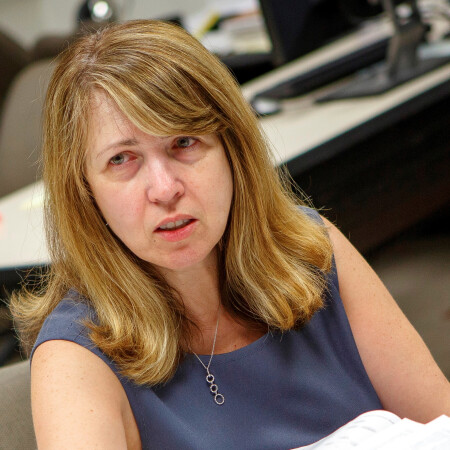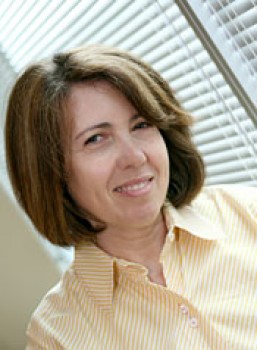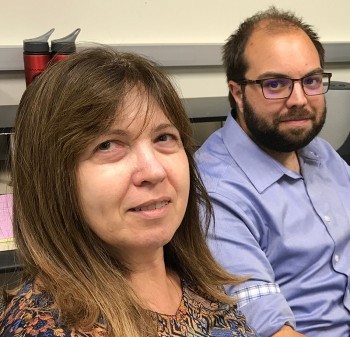Ph.D. - Computer Engineering
University of Southern California - 1997

Sanda Harabagiu
Research Initiation Chair
Professor - Computer Science
Professional Preparation
Doctorate - Electrical Engineering and Computer Science
University of Rome - 1994
University of Rome - 1994
Diploma - Engineer in Computer Science and Engineering
Polytechnic Institute of Bucharest - 1983
Polytechnic Institute of Bucharest - 1983
Research Areas
Research Interests
- Natural Language Processing
- Medical Informatics
- Artificial Intelligence for Public Health
Publications
Scaling up the discovery of hesitancy profiles by identifying the framings of beliefs towards vaccine confidence in Twitter discourse 2023 - Publication
Epidemic Question Answering: Question Generation and Entailment for Answer Nugget Discovery 2023 - Publication
Adaptation and Dissemination of a National Cancer Institute HPV Vaccine Evidence-Based Cancer Control Program to the Social Media Environment 2022 - Publication
From Hesitancy Framings to Vaccine Hesitancy Profiles: A Journey of Stance, Ontological Commitments and Moral Foundations 2022 - Publication
Identifying the adoption or rejection of misinformation targeting the COVID-19 vaccines in Twitter discourse 2022 - Publication
VaccineLies: Natural Language Resources for Learning to Recognize Misinformation about the COVID-19 and HPV Vaccines 2022 - Publication
Automatic detection of COVID-19 vaccine misinformation with graph-link prediction 2021 - Publication
Appointments
Professor
The University of Texas at Dallas [2014–Present]
The University of Texas at Dallas [2014–Present]
Associate Professor
The University of Texas at Dallas [2002–2014]
The University of Texas at Dallas [2002–2014]
Assistant Professor
The University of Texas [2001–2002]
The University of Texas [2001–2002]
Assistant Professor
Southern Methodist University [1998–2001]
Southern Methodist University [1998–2001]
Researcher
SRI International [1997–1998]
Artificial Intelligence Center
SRI International [1997–1998]
Artificial Intelligence Center
Research Associate
Southern Methodist University [1996–1997]
Southern Methodist University [1996–1997]
Research Assistant
Souther Methodist University [1994–1996]
Souther Methodist University [1994–1996]
Research Assistant
University of Southern California [1992–1993]
University of Southern California [1992–1993]
Research Fellow
Fondazione Ugo Bordoni [1991–1993]
Fondazione Ugo Bordoni [1991–1993]
Researcher
INCREST (Romanian National Research Institute) [1985–1991]
INCREST (Romanian National Research Institute) [1985–1991]
Projects
Multimedia Vaccine Informatics System for Discovering Vaccine Hesitancy in Social Media
2021/03 Guided by (a) theories of communication; (b) models of vaccine hesitancy; as well as (c) novel ArtificialIntelligence techniques, enabled by Large Language Models (LLMs) and Large Multimedia Models (LMM) we
process tens of millions of social media postings collected from Facebook, Instagram and X/Twitter to
discover how hesitancy towards the COVID-19, the Human Papillomavirus and Influenza vaccines is framed in
social media discourse.
Automatic discovery and processing of EEG cohorts from clinical records
2014/06–2019/10 The primary goal of this proposal is to enable comparative research by automatically uncovering clinical knowledge from a vast big data archive of clinical EEG and EMR data collected over the past 12 years at Temple University Hospital. We develop a proof-of-concept based on the discovery of patient cohorts and provide an annotated big data archive (including a semantic index). This resource will greatly increase accessibility for non-experts in neuroscience, bioengineering and medical informatics, and demonstrate the transformative potential of mining the staggering wealth of biomedical knowledge available in hospital EMRs.AQUAINT
2002/02–2008/12 Research in Question AnsweringAdditional Information
Honors and Awards
- American Medical Informatics Association 2019 Distinguished Paper Award
- The 2018 AMIA Clinical Research Informatics Award
- American Medical Informatics Association 2017 Homer Warner Award
- AQUAINT-3 award AQUINAS: Answering Questions Using INference and Advanced Semantics", 2006-2008.
- AQUAINT-2 award "AQUINAS: Answering Questions Using INference and Advanced Semantics", 2004-2008.
- AQUAINT award "Computational Implicatures for Advanced Question Answering", 2002-2005.
- National Science Foundation Faculty Early CAREER Development Award, 2000-2005.
- National Science Foundation award "CADRE: A Tool for Transforming WordNet into a Core Knowledge Base", 2000-2004.
- ARP award "Open-Domain Information Extraction", 2002-2004. Southern Methodist University Research Award, 1999-2000.
- Fondazione Ugo Bordoni Research Award, 1991-1993.
Professional Activities
- Organizer with Drs. Daniel Bobrow, Dan Moldovan, Christopher Manning, Srini Narayanan and Ken Forbus of the AAAI-05 Workshop on Inference for Textual Question Answering, July 9 2005, Pittsburgh, PA.
- Co-chair with Dr. David Farwell of the ACL-2004 Workshop on Reference Resolution and its Applications, Barcelona, Spain, July 2004.
- Co-instructor with Dr. Srini Narayanan of the HLT-NAACL'2004 Tutorial on Semantic Inference for Question Answering, Boston MA, May 2004.
- Co-chair with Finley Lacatusu of the HLT-NAACL'2004 Workshop on Pragmatics of Question Answering, Boston MA, May 2004.
- Co-chair with Prof. Rodolfo Delmonte of the 2003 International Symposium on Reference Resolution for Question Answering and Summarization, Venice, Italy, June 2003.
- Co-Chair with Drs. Nancy Chinchor, Beth Hezler and Lucy Nowell of the ACL'2002 Workshop on Natural Language Processing and Vizualization.
- Co-chair with Dr. Vinay Chaudhri of the AAAI-2002 Spring Symposium on Mining Answers from Texts and Knowledge Bases, Stanford University, March 2002.
- Co-chair with Prof. Antonio Ferrandez Rodriguez of the 2002 International Symposium on Reference Resolution in Natural Language Processing, Alicante, Spain, June 2002.
- Instructor of the COLING-2002 Tutorial on Question/Answering Systems.
- Co-instructor with Prof. Dan Moldovan of the IJCAI-2001 Tutorial on Question/Answering Systems.
- Co-instructor with Prof. Dan Moldovan of the NA-ACL-2001 Tutorial on Question/Answering Systems.
- Co-Organizer with Prof. Dan Moldovan of the NA-ACL'2001 Workshop WordNet and other Lexical Resources - Extensions and NLP Applications.
- Co-Organizer with Yael Ravin and John Prager from IBM Research of the ACL'2001 Workshop on Open-Domain Question Answering.
- Led the research committee that developed the Roadmap for Question Answering Research for the years 2001-2006. This activity has been undertaken under the DARPA TIDES project.
- Co-Organizer with Joyce Chai from Duke University of the COLING-ACL '98 Workshop on Usage of WordNet in Natural Language Processing Systems, 1998.
- Editor Proceedings of the COLING-ACL'98 Workshop on the Usage of WordNet in Natural Language Processing Systems, Montreal, Canada, August 1998.
News Articles
Prof Calls Jeopardy! Match a Computing Milestone
 When an IBM supercomputer named Watson takes on human contestants on the quiz show Jeopardy! this week, it will represent the latest triumph of advances that could one day enable people to interact much more naturally with computers, according to a UT Dallas expert in human-machine interaction. “This is a milestone because Watson will compete directly against humans, and moreover against the champions of Jeopardy!” said Dr. Sanda Harabagiu, a leader in the field of human-computer interaction for more than a decade. “This is important, and it’s a more realistic gauge than simply comparing a system to search engines.” It’s hard enough to create a system that can interact via spoken language fast enough to compete on Jeopardy!, but Harabagiu and her collaborators in the University’s Human Language Technology Research Institute are already working on even more complex human-computer interactions.
When an IBM supercomputer named Watson takes on human contestants on the quiz show Jeopardy! this week, it will represent the latest triumph of advances that could one day enable people to interact much more naturally with computers, according to a UT Dallas expert in human-machine interaction. “This is a milestone because Watson will compete directly against humans, and moreover against the champions of Jeopardy!” said Dr. Sanda Harabagiu, a leader in the field of human-computer interaction for more than a decade. “This is important, and it’s a more realistic gauge than simply comparing a system to search engines.” It’s hard enough to create a system that can interact via spoken language fast enough to compete on Jeopardy!, but Harabagiu and her collaborators in the University’s Human Language Technology Research Institute are already working on even more complex human-computer interactions.
Computer Science Professor Earns Distinguished Paper Award
 Travis Goodwin BS'11, MS'13, a computer science PhD student at UT Dallas, and Dr. Sanda Harabagiu, professor of computer science and Research Initiation Chair in the Erik Jonsson School of Engineering and Computer Science, received the Homer R. Warner Award at the 2017 American Medical Informatics Association’s (AMIA) Annual Symposium.
Travis Goodwin BS'11, MS'13, a computer science PhD student at UT Dallas, and Dr. Sanda Harabagiu, professor of computer science and Research Initiation Chair in the Erik Jonsson School of Engineering and Computer Science, received the Homer R. Warner Award at the 2017 American Medical Informatics Association’s (AMIA) Annual Symposium.The award recognizes a symposium paper that best describes approaches to improving computerized information acquisition, knowledge data acquisition and management, and experimental results documenting the value of these approaches.
Human Language Technology Research Institute Established at The University of Texas at Dallas
RICHARDSON, Texas (Feb. 25, 2002) - The University of Texas at Dallas (UTD) today announced that it has established a research institute aimed at advancing the understanding and uses of natural language processing, a science that has grabbed the attention of federal government intelligence agencies in the wake of Sept. 11.The technology, which utilizes sophisticated software tools, has the potential to help security personnel simultaneously screen and analyze millions of voice and text communications in an attempt to uncover terrorist or other criminal activities. Other possible uses include customer support applications in many lines of business.
The research, new at UTD, will be carried out at the newly established Human Language Technology Research Institute in the Erik Jonsson School of Engineering and Computer Science. The effort will be headed by Dr. Sanda Harabagiu, director of the institute and an associate professor of computer science in the Jonsson School. Harabagiu also holds the Jonsson School Research Initiation Chair Professorship.